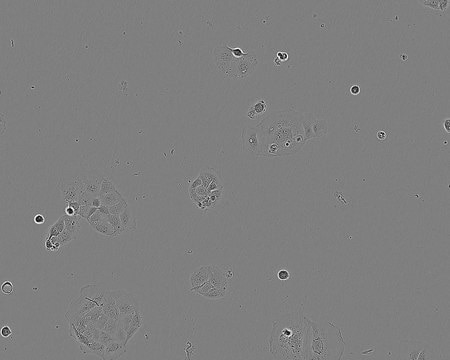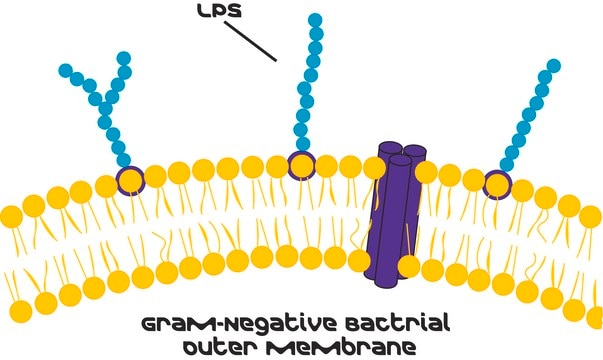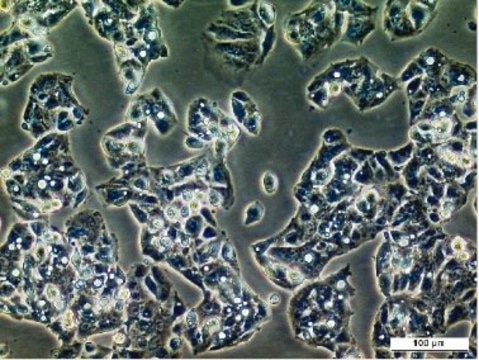SCC223
THP-1 NF-kappaB-eGFP Human Acute Monocytic Leukemia Cell Line
Sign Into View Organizational & Contract Pricing
All Photos(1)
About This Item
UNSPSC Code:
41106514
eCl@ss:
32011203
NACRES:
NA.28
Recommended Products
description
Cell line type: Cancer Cells
technique(s)
cell culture | mammalian: suitable
General description
Microbial contamination of biological cultures is a universal concern for laboratories. Detection and monitoring of microbial contamination often require a significant commitment of time, labor and expense, especially when maintaining multiple cultures and preserving precious specimens. Methods that are at once efficient, cost-effective, and sensitive for a range of microbial contamination are of great value in facilitating detection and ensuring contamination-free cultures.
The THP-1 NF-κB-eGFP cell line makes use of the toll-like receptor (TLR) signaling pathway as a simple and sensitive biological assay for detection of microbial contamination. The suite of TLR proteins recognize distinct molecular signatures conserved across bacterial species and activate the transcription factor NF-κB. THP-1 NF-κB-eGFP cells exhibit high sensitivity for mycoplasma and gram-negative bacterial LPS (1). Incubation of THP-1 NF-κB-eGFP cells for 24 hours with contaminated culture supernatants activates expression of the eGFP reporter which may be easily detected via flow cytometry or light microscopy (1). Presence of amphotericin B in cultures also induces the reporter gene.
Source:
The THP-1 NF-κB-eGFP cell line is derived from a single-cell clone of THP-1 cells stably transfected with an NF-κB-eGFP reporter construct (1). The parental THP-1 cell line was derived from peripheral blood of a 1-year-old male suffering from acute monocytic leukemia (2).
References:
1. PLOS One. 2017; 12(5): e0178220
2. Int J Cancer. 1980; 26(2): 171-176.
The THP-1 NF-κB-eGFP cell line makes use of the toll-like receptor (TLR) signaling pathway as a simple and sensitive biological assay for detection of microbial contamination. The suite of TLR proteins recognize distinct molecular signatures conserved across bacterial species and activate the transcription factor NF-κB. THP-1 NF-κB-eGFP cells exhibit high sensitivity for mycoplasma and gram-negative bacterial LPS (1). Incubation of THP-1 NF-κB-eGFP cells for 24 hours with contaminated culture supernatants activates expression of the eGFP reporter which may be easily detected via flow cytometry or light microscopy (1). Presence of amphotericin B in cultures also induces the reporter gene.
Source:
The THP-1 NF-κB-eGFP cell line is derived from a single-cell clone of THP-1 cells stably transfected with an NF-κB-eGFP reporter construct (1). The parental THP-1 cell line was derived from peripheral blood of a 1-year-old male suffering from acute monocytic leukemia (2).
References:
1. PLOS One. 2017; 12(5): e0178220
2. Int J Cancer. 1980; 26(2): 171-176.
Application
This product is intended for sale and sold solely to academic institutions for internal academic research use per the terms of the “Academic Use Agreement” as detailed in the product documentation. For information regarding any other use, please contact licensing@emdmillipore.com.
Quality
- Each vial contains >=1X106 viable cells.
- Cells are tested negative for infectious diseases by a Human Essential CLEAR panel by Charles River Animal Diagnostic Services.
- Cells are verified to be of human origin and negative for inter-species contamination from rat, mouse, chinese hamster, Golden Syrian hamster, and non-human primate (NHP) as assessed by a Contamination CLEAR panel by Charles River Animal Diagnostic Services.
- Cells are negative for mycoplasma contamination.
- Each lot of cells is genotyped by STR analysis to verify the unique identity of the cell line.
Storage and Stability
Store in liquid nitrogen. The cells can be cultured for at least 10 passages after initial thawing without significantly affecting the cell marker expression and functionality.
Disclaimer
This product contains genetically modified organisms (GMO). Within the EU GMOs are regulated by Directives 2001/18/EC and 2009/41/EC of the European Parliament and of the Council and their national implementation in the member States respectively. This legislation obliges {HCompany} to request certain information about you and the establishment where the GMOs are being handled. Click here for Enduser Declaration (EUD) Form.Unless otherwise stated in our catalog or other company documentation accompanying the product(s), our products are intended for research use only and are not to be used for any other purpose, which includes but is not limited to, unauthorized commercial uses, in vitro diagnostic uses, ex vivo or in vivo therapeutic uses or any type of consumption or application to humans or animals.
RESEARCH USE ONLY. This product is regulated in France when intended to be used for scientific purposes, including for import and export activities (Article L 1211-1 paragraph 2 of the Public Health Code). The purchaser (i.e. enduser) is required to obtain an import authorization from the France Ministry of Research referred in the Article L1245-5-1 II. of Public Health Code. By ordering this product, you are confirming that you have obtained the proper import authorization.
wgk_germany
WGK 1
flash_point_f
Not applicable
flash_point_c
Not applicable
Certificates of Analysis (COA)
Search for Certificates of Analysis (COA) by entering the products Lot/Batch Number. Lot and Batch Numbers can be found on a product’s label following the words ‘Lot’ or ‘Batch’.
Already Own This Product?
Find documentation for the products that you have recently purchased in the Document Library.
Our team of scientists has experience in all areas of research including Life Science, Material Science, Chemical Synthesis, Chromatography, Analytical and many others.
Contact Technical Service



